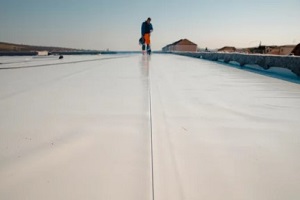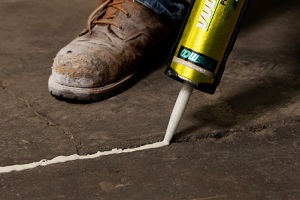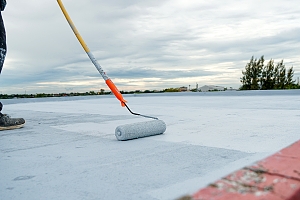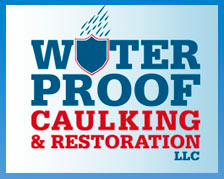 Commercial buildings in Delaware are subjected to a wide range of environmental stressors. From higher than average rainfall each summer to snow storms leaving inches of accumulation behind, the constant strain that buildings face in the state never stops. Moisture is a particular problem as many of these weather events create humid, damp conditions.
Commercial buildings in Delaware are subjected to a wide range of environmental stressors. From higher than average rainfall each summer to snow storms leaving inches of accumulation behind, the constant strain that buildings face in the state never stops. Moisture is a particular problem as many of these weather events create humid, damp conditions.
If your building does not have waterproofing, this moisture could be doing more harm than you realize. Here is what happens if you don’t waterproof your commercial building in Delaware, and what you can do to fix the problem.
The Signs of Water Damage
Waterproofing a building is not a one size fits all approach; instead, the process should be customized to suit each structure’s unique challenges, shapes and materials. Because of that, the signs indicating that water has infiltrated will also be specific to each building.
In general, a building may not show any signs of damage if it has not been waterproofed—at least for some time. While everything appears to be fine on the outside, underneath the surface layers of the building’s material, damage is likely already occurring.
Water is hazardous to commercial buildings. In the summer, the moisture intrudes into areas that have not been waterproofed, such as the porous surface of brick or cracks where caulking has worn down. Once inside, it will infiltrate into wooden support structures, interior walls and masonry.
Signs of this process will not become evident until damage has already been done. At this point, you may notice moldy or moist spots on the walls, or the interior air may begin to smell stale and mildewy. The exterior bricks may begin to crack and separate as water enters gaps and then expands and contracts with the weather.
 Winter does not alleviate the problem. Snowfall that collects at the base of a structure will continually melt and reform as temperatures fluctuate, trapping moisture in direct contact with a non-waterproofed surface. Delaware commercial buildings cannot escape these natural processes, which is why it is important to waterproof them as soon as possible.
Winter does not alleviate the problem. Snowfall that collects at the base of a structure will continually melt and reform as temperatures fluctuate, trapping moisture in direct contact with a non-waterproofed surface. Delaware commercial buildings cannot escape these natural processes, which is why it is important to waterproof them as soon as possible.
If you see signs of water damage, such as cracks, mold, gaps, failed caulking, stains or algae growth, talk to an expert to explore options for remediating the issue and preventing it in the future.
Can You Waterproof at Any Time?
If you are concerned about the damage your building is facing and want to waterproof after the fact: the answer to “can you waterproof anytime” is yes and no. Some types of waterproofing are applied to areas of the structure that are later covered up during building. However, many other waterproofing options can be applied after construction is completed.
A professional waterproofing contractor can walk you through these options to find the one that best suits both your budget and your building’s needs. There are also waterproofing-related fixes that can be done to decrease water penetration, such as correcting damaged caulking.
Commercial Waterproofing Options
When a commercial building is still being constructed, the creation of the foundation is an opportune time to waterproof it. With this option, the foundation is coated with a water-resistant layer that remains breathable, which ensures that outside water cannot get in while internal moisture can still find its way out.
However, once a building has been constructed, access to the foundation is limited or eliminated completely. Thus, foundation waterproofing may not be an option in most instances. There are some niche types of waterproofing that can still access the foundation to apply waterproofing by digging down to it. However, more commonly, businesses will choose membrane application to put a stop to their water problems.
 Membranes can be applied to the interior or exterior of a structure (or both) and do not result in any visible change to the building. The membrane is clear and will adhere to all of the inconsistencies in the material under it, such as the pock marks within bricks and concrete or special patterns and designs that were included during construction.
Membranes can be applied to the interior or exterior of a structure (or both) and do not result in any visible change to the building. The membrane is clear and will adhere to all of the inconsistencies in the material under it, such as the pock marks within bricks and concrete or special patterns and designs that were included during construction.
Once a membrane is applied and is cured or dried, its bond with the underlying material becomes permanent. It prevents water from entering without blocking interior humidity from escaping. For those still in the construction phase, purchasing concrete that is waterproof on a molecular level is also an option.
Get Delaware Commercial Waterproofing from the Pros
If your commercial building in Delaware has the negative effects of the state’s high moisture, it is not too late to begin the process of waterproofing.
The experts at Waterproof Caulking & Restoration can help you to understand your options and tackle important jobs including caulking repair in addition to a waterproofing project for the best results. Contact us to learn more about waterproofing your building or to schedule an appointment to get started.
